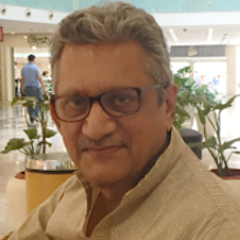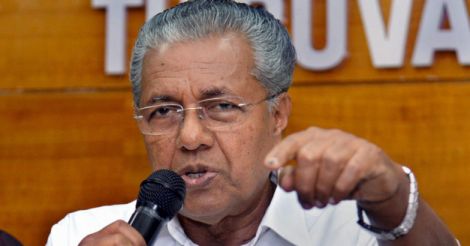Among the many reasons advanced by political analysts for the recent cabinet reshuffle at the center the most significant was that it was a reflection of Prime Minister Modi's desire to avoid unnecessary controversies over peripheral issues that tend to distract attention from the government's focus on development. If that is indeed the case, it certainly is welcome. In Kerala, opposition leader Ramesh Chennithala has been accusing chief minister Pinarayi Vijayan of following in the footsteps of Modi whose personality is a red rag to the Congress party and the other so-called secular parties including those of the Left Front.
Apolitical observers, however, would not be surprised if two political leaders having divergent political and social perspectives have some common leadership qualities. Both Modi and Pinarayi are known to be effective in getting things done. Indeed, this is a quality that the people expect to see in their leaders at both national and state levels. UPA was voted out because of a namby-pamby image, apart from the allegations of corruption in spite of having good economic programs and a squeaky clean prime minister. As people come out of the stupor imposed by centuries of feudal oppression in much of India and induced by the euphoria of living in a comparatively more progressive and egalitarian state in Kerala, they have become impatient for further forward movement. They want action and dynamism. Business-as-usual attitude will not do anymore.
If a government is to come up to the expectations of the people, it should have a clear and well-defined vision about the future and it should not be a prisoner of ideologies or past shibboleths. A dynamic ideology is one that evolves. Deng Xiaoping recognized this and made appropriate changes in the strategy for China's modernization. The result is there for everyone to see. It is ridiculous to follow the Stalinist model in the 21st century in an open democracy with a mixed economy. We need to recognize that the private sector's dynamism has to be fully utilized if the country and the state are to make rapid economic strides.
CBI is no touchstone for crime probes, Kerala cops should do better
The curious connect between Bourbon kings of France and Congress
It is equally important to recognize that some successful policies of the past cannot be considered immutable core of public policy forever. Some of these served a purpose at a certain time but have run out of steam now. Abandoning or modifying these will not be regressive even though our Margadarshak Castro may not agree. Petulant screaming by some leaders in their second childhood is better ignored.
The chief minister has so far acted with great discretion and restraint while making it quite clear that his vision of communism does not respect unionism without a commitment to duty and honest public service. He is more effectively in control of a cadre-based party than Modi is. The militant and lumpen elements that were allowed a free run when the party was in the opposition need to be disciplined or thrown out if they are found not amenable to party discipline. As pointed out earlier in these columns, the chief minister has to reach out to all the apolitical social forces, even those who had been perceived inimical in the past, and also the political opposition to create a generally peaceful environment that is required for progress.
Nobody expects the opposition political parties to keep quiet and allow the ruling dispensation to make unimpeded progress. Nevertheless it should be possible to arrive at a broad consensus on some of the basic issues and a shared vision of the future. At least there should be some consensus about where we want to go. It should be clear to everyone that we are not trying to keep up with progressive states like Gujarat, Maharashtra or Tamil Nadu but to fast forward to be at par with China or Singapore. Our whole mindset needs to change if we are not to get bogged down by idiotic statements of some leaders that a North-South Expressway would divide the state or that a wide-grade separator in a highway is an unnecessary luxury.
While it may be counterproductive to stop any project that is already under implementation, it is important that any plan for improvements to infrastructure should be adequate to meet more than the anticipated demand though a lot of petty minded people might criticize it as a waste of resources. The past experience even in India is that improvements in infrastructure generate far greater demand than originally anticipated.
Parallel to the efforts to improve transport and power infrastructure and education quality, should be well-designed projects to alleviate poverty and uplift the economic status of the poorest of the poor. Unfortunately, our past schemes and rules have been treating the entire lower strata of society as one ungraded segment, with the result that all the benefits of government schemes for such people have been cornered by the more affluent and more advanced among them. Only the separate reservation for different communities has ensured that all the backward communities got at least some benefits. On the other hand, some policy decisions taken by the governments in the past under pressure from the more vocal and articulate sections have made a mockery of even Supreme Court decisions. The high threshold-level fixed for the creamy layer in backward classes is an example.
The most effective way of lifting a family from the morass of poverty is to give good professional education and employment to at least one member, preferably a girl child, of the family. This can be done if preference is given to the children from poorer families even within the reserved categories. Only if no candidate from the poorest of the poor is available should children from the next higher bracket be considered.
Such a policy will, of course, provoke loud protests from vocal elements who will lose out since the really deserving people are a silent majority. Government should be able to see through this game and refuse to be cajoled by these influential people and their organizations. It is also possible to have reservation within reservation as is the case with the central government reservation for candidates with disability. In the same way, there should be reservation for girls in all the categories. My observation is that a daughter of a family in distress takes better care of the rest of the family if she is able to find a job, than a son. Hence special preference should be given to girl children in the reserved categories.
Even the fee structure of government colleges needs revision. We have seen a great deal of debate on the subject of big differences in the fees charged by government colleges and self-financing colleges. The fact is the fees of government colleges are highly subsidized. On the other hand, a majority of the students gaining admission on merit to government professional colleges are from the more affluent families who do not need such subsidy. If need be, they can very well take educational loans. Instead of charging only subsidized fees from all, government should give free education to the really poor who cannot afford to pay even the subsidized fees. The only problem in this is that getting an income certificate involves bribing the concerned officials in most cases. This is where government will have to come down heavily on the corrupt elements among government employees.
My five-year stint as a member of UPSC was an eye-opener that exposed me to the extent of distortion of the reservation system. I have been and I continue to be a champion of reservation for the needy. Unfortunately those who really need reservation only get the crumbs left out by the rich and the resourceful. Take the case of Meenas. They are included among the schedule tribes though they do not deserve to be there if the criteria laid down by the Supreme in the case of Gujjars were to be applied to them. Yet, almost 80 percent of the jobs reserved for ST in the all-India recruitment are cornered by them at the expense of the real tribals of Jharkhand, Chattisgarh, Odissa and the North East.
Meenas are concentrated in just three or four districts of Rajasthan but it is not possible to form a government in Rajasthan without their support. Both BJP and Congress, therefore, would not like to offend them. It is said that there is hardly a Meena family which does not boast of an IAS or IPS officer as member! A significant number of persons who came for civil services interview in the SC category were children of senior government officers who had the benefit of attending the best of schools and colleges in the country. How can a child coming from a rural dalit family compete with them? What happens in the OBC quota is even more strange. This whole quota is appropriated by a handful of communities who are actually affluent and powerful. In theory, the percentage of OBC population in the country is very large but, in practice, the actual beneficiaries belong to a very small percentage among them.
The right solution to this problem would be to exclude the more affluent and advanced among the reserved categories so that the truly deserving can benefit from the reservation policy. This will not happen at the national level any time soon as the beneficiaries are too powerful. Yet, the state government should be able to tweak its reservation policy so that children coming from the poorer families get preference over children of the relatively more affluent families of the same community. Will the state government have the courage to take such a revolutionary step? That will be a big challenge.
Everyone in public life pays lip service to the cause of the poor. Yet, nobody seems to have the courage to take bold steps to solve the problems of the poor tribals of Attappadi or the really poor Ezhava children of Travancore. The abkari contractors and the real-estate mafia are far too powerful to allow this.
(The author is a former civil aviation secretary and former member, Union Public Service Commission. The views expressed are personal.)

























 Kerala chief minister Pinarayi Vijayan attends a press meet. File photo
Kerala chief minister Pinarayi Vijayan attends a press meet. File photo